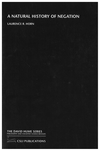

|
|
|
|

A Natural History of NegationThe capacity to negate is the capacity to refuse, to contradict, to lie, to speak ironically, to distinguish truth from falsity—in short, the capacity to be human. This book offers a unique synthesis of past and current work on the structure, meaning, and use of negative expressions. It draws from work in the philosophy of language and mind, in psychology, and in linguistics (from the interacting levels of morphology, syntax, semantics, pragmatics, and lexicon). As its title suggests, A Natural History of Negation is first of all a critical synopsis and reinterpretation of past work on negation, both in the West and the East. Negation is a topic which engaged Aristotle and the Buddha, Spinoza and Leibniz, Hegel and Mill, Freud and Marx, Russell and Frege. This otherwise rather disparate collection of scholars shared a recognition of the paradox posed by the contrast between the standard logical role of this most basic operator (simple truth-value reversal) and the incredible complexity of the form and function of negative sentences in natural language. The logical symmetry between affirmative and negative propositions is at odds with a striking asymmetry in language structure and language use. Much of the descriptive, theoretical, and empirical work on negation over the last 25 centuries has focused on the relatively marked, complex, or subjective nature of the negative statement. After tracking its intellectual history, Horn reexamines this asymmetry from the perspective of the neo-Gricean pragmatic framework he has developed to account for inference and language change. The core chapters in the book examine the role of negation within the concept of presupposition, the psycholinguistics of how children acquire negation and how adults process it, the relation of negation to scalar predicates and implicature, the tendency to strengthen sentential negation (as in I don't like it or I don't think she's coming) to a contrary reading (I dislike it, I think she's not coming), the device of metalinguistic negation (I don't like it-I LOVE it) as a means for objecting to the appropriateness of an utterance rather than denying the truth of a proposition, the structural and functional motivation for the cyclical shifts in the position and form of negative particles, and the treatment of negation-following both Montague and Aristotle-as a mode of predication, i.e. as a way to put subject and predicate together, rather than as a standard one-place propositional connective. While based largely on the analysis of English, this study encompasses a wide range of languages in an attempt to determine the parameters of variation in the expression of negative concepts. An extensive bibliography is included. For the CSLI reissue of this volume, Horn has prepared a comprehensive state-of-the-art preface surveying work on negation by a wide variety of scholars that has appeared during the years since the appearance of NHN. The preface begins with an overview of work on the syntax of negation and on negative polarity and then moves on to summarize, with full bibliographic documentation, recent and current developments relating to the topics covered in the book. It is accompanied by an extensive bibliography listing the significant anthologies, dissertations, books, and journal articles in the field that were published since 1988. is professor and director of undergraduate studies in the Department of Linguistics at Yale University.Translated into Japanese. Contents
7/15/2001 ISBN (Paperback): 1575863367 (9781575863368)
Subject: Grammar, Comparative and general--Negatives; Negation (Logic); Language and languages—Philosophy |
Distributed by the
University of Chicago Press |
|
pubs @ csli.stanford.edu
|
CSLI Publications
Stanford University Cordura Hall 210 Panama Street Stanford, CA 94305-4101 (650) 723-1839 |